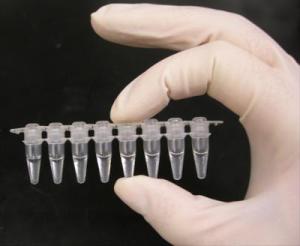|
Related Topics: |
|
|
|
Current News |
|
Chemistry A to Z |
|
About Internetchemistry |
Polymerase Chain Reaction |
|
Scientists in Japan are reporting development of a faster, less expensive version of the fabled polymerase chain reaction (PCR) a DNA test widely used in criminal investigations, disease diagnosis, biological research and other applications. The new method could lead to expanded use of PCR in medicine, the criminal justice system and elsewhere, the researchers say. Their study was published in the July 15, 2009, issue of Analytical Chemistry, a semi-monthly journal [open access article, see below]. |
|
In the new study, Naohiro Noda and colleagues note that PCR works by "amplifying" previously undetectable traces of DNA almost like photocopiers produce multiple copies of documents. With PCR, crime scene investigators can change traces of DNA into amounts that can be identified and linked to a suspect. Biologists can produce multiple copies of individual genes to study gene function, evolution, and other topics. Doctors can amplify the DNA from microbes in a patient's blood to diagnose an infection. Current PCR methods, however, are too expensive and cumbersome for wide use. The scientists describe development and testing of a new PCR method, called the universal QProbe system, that overcomes these problems. Existing PCR processes require several "fluorescent probes" to seek out DNA. QProbe substitutes a single "fluorescent probe" that can detect virtually any target, saving time and cutting costs. The new method also is more specific, accurately detecting DNA even in the presence of unfavorable PCR products in the samples that may interfere with quantification results. |
|
|
|

